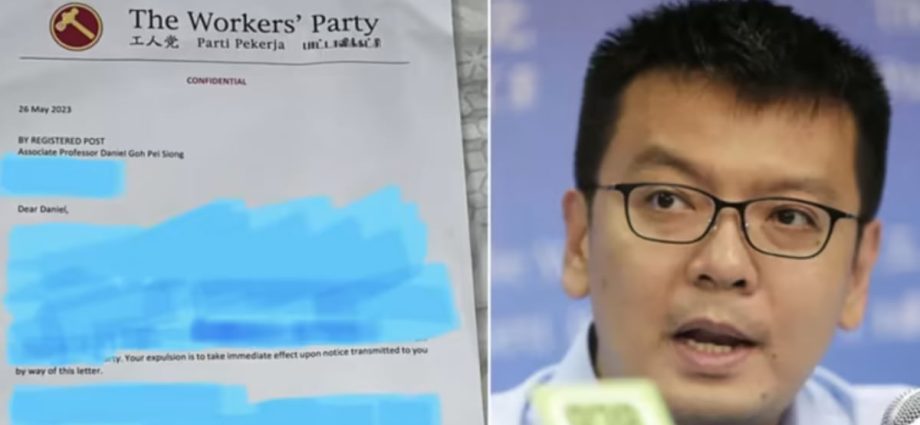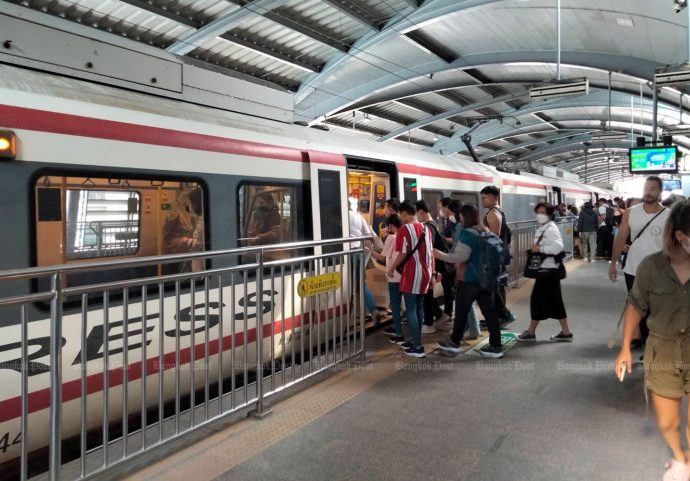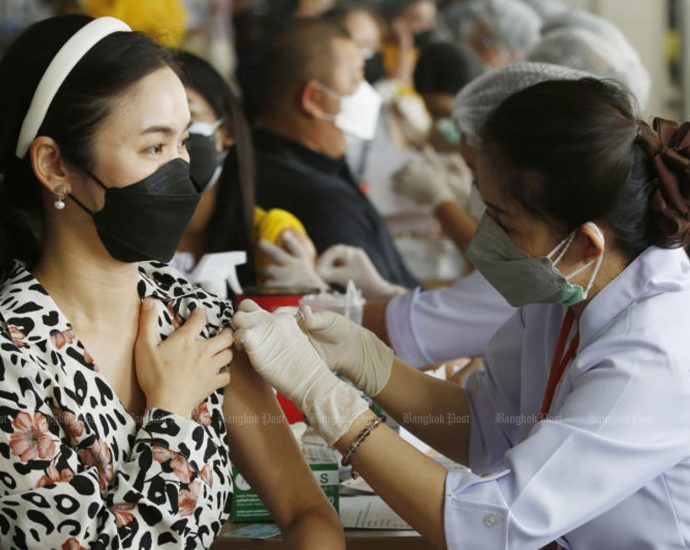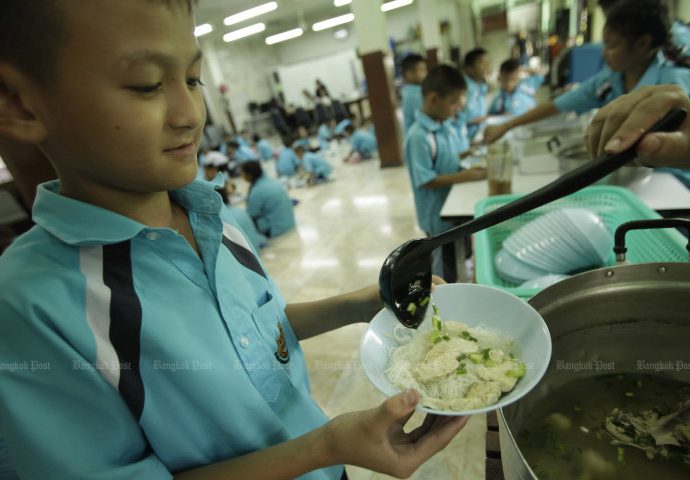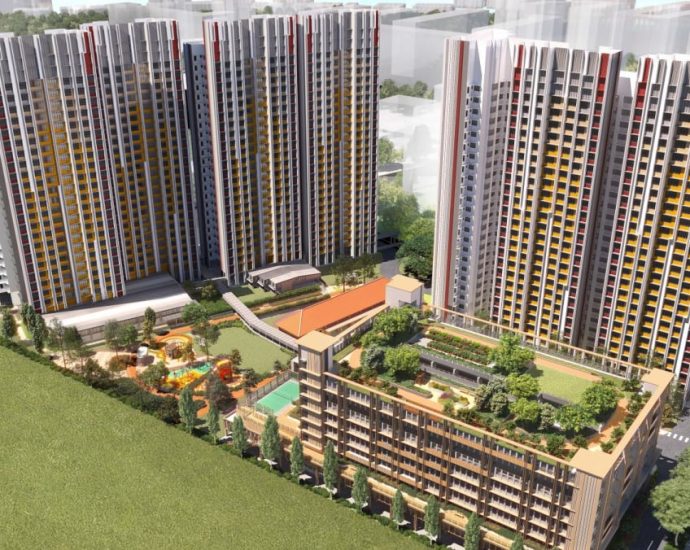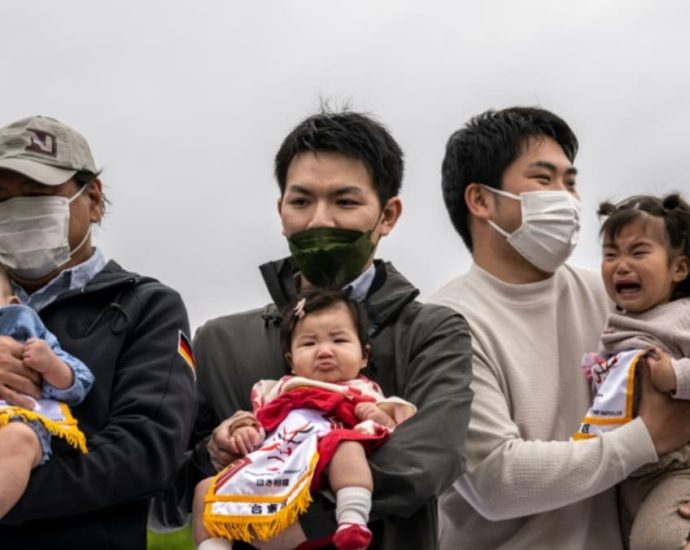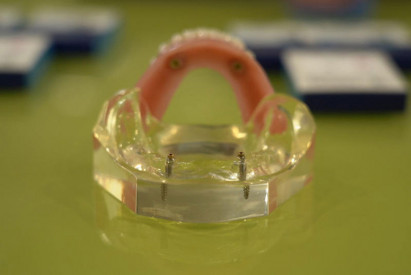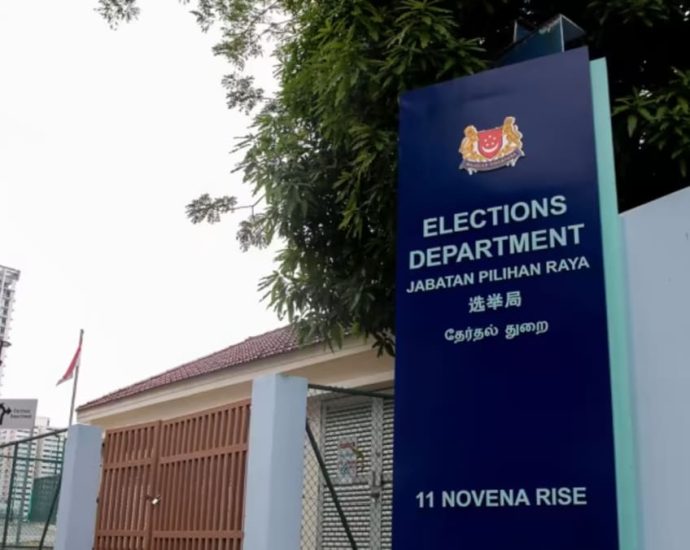Ex-NCMP Daniel Goh says he is expelled from Workers’ Party
SINGAPORE: Former Non-Constituency Member of Parliament (NCMP) Daniel Goh said on Thursday (Jun 1) that he has been expelled from the Workers’ Party (WP). The reason for the expulsion given to him in a letter by WP pertains to him disclosing information about the “inner workings” of the opposition party, heContinue Reading
Losses mount at Airport Rail Link
Ridership 25% below pre-pandemic levels despite SRT deal with private operator

The Airport Rail Link (ARL) service has been losing 70 million baht a month as it is carrying fewer commuters than the pre-pandemic levels of 2019, according to State Railway of Thailand (SRT).
During the pandemic, the SRT decided to tackle long-standing operational issues on the mass-transit line it operated by allowing a private company to help run rail operations.
A memorandum of understanding (MoU) was signed with Asia Era One — also the concessionaire for the high-speed rail system linking the three airports — on Oct 20, 2021 to take over the ARL operation last year. The company also started managing the Red Line electric train service in late 2021.
About 1.87 million commuters take the ARL each month, a 25% drop compared with about 2.5 million in 2019, SRT governor Nirut Maneephan said on Thursday.
The agreement with Asia Era One called for the company to pay 10.6 billion baht to the SRT for rights to the operation by Oct 24, 2021. But the company proposed to pay by instalments which led to a revision of the co-investment contract.
The SRT has yet to transfer the executive rights to the ARL to the company, pending contract revision.
The MoU is renewed every three months until it is finished. “For now, the company is only paying interest to the SRT,” Mr Nirut said.
Frequent technical glitches leading to service interruptions have been a long-standing complaint of regular ARL users.
In January, the ARL encountered technical issues five times — propulsion system issues twice and also problems related to the brake, door and signal systems — which resulted in delays of 6-19 minutes.
The system also encountered propulsion system issues three times in February, twice each in March and April, Mr Nirut said.
A source familiar with the system said Asia Era One shouldered higher rail management costs than the SRT as staff-related expenses had doubled, while other expenses relating to electricity and maintenance remained the same.
The number of trips remains unchanged. But the income earned from the ARL services are still insufficient due to the low number of commuters, said the source.
More help for at-risk marine species
Pilot projects in Trat, Trang and Pattani could build case for more funding

Researchers are looking into the potential returns from certifying Marine Protected Areas (MPA) in Trat, Trang and Pattani provinces as a means to make money to help endangered marine species.
It is hoped the results will provide empirical evidence to secure fresh funding for environmental protection and management policies which should yield a profit later on, said Wiparat Dee-ong, the NRCT director.
Orapan Srisaowalak, an independent researcher, said the research aims to analyse whether environmentally friendly policies that also limit commercial activity can ultimately turn a profit and benefit the public as well as provide an additional layer of protection for ocean habitats.
She said Trat’s gulf is known to be the habitat of Irrawaddy dolphin, a rare species that is seldom spotted in Thailand. Many endangered marine animals also are seen along Trang’s coast in the South, such as Indo-Pacific humpbacked dolphins, bottlenose dolphins, Indo-Pacific finless porpoises and dugongs.
Koh Losin in Pattani is listed as an off-shore MPA where many coral reefs are intact and a crucial source of food for rare fish such as whale sharks, guitarfish and manta rays.
Ms Orapan added that Koh Losin has been prone to damage by human activities such as fishing and tourism.
She said the budget to manage the MPAs in Trat, Trang and Pattani would be 671 million baht. However, the cost does not include compensation for fishermen if new fishing-prohibited areas are announced.
There will also be budgets for planting seagrass and mangroves as well as sea mammal protection, she added.
The benefits of endorsing MPA policies and management are increasing revenue from coastal fisheries, higher carbon credit value from seagrasses and mangroves and non-use value of rare marine species found in MPAs.
Although previous research into these areas indicated that society will gain less than the money spent on marine animal protection, those results were based on non-use value which might not reflect the actual worth of the lost wildlife and reduction in long-term economic potential in the future, added Ms Orapan.
Public urged to get free flu jabs
Coverage widened but so far only about 10% of those eligible have been vaccinated

The National Health Security Office (NHSO) is urging Thais to register for a flu vaccine, especially if they are eligible to get one free under a new government initiative that will run until the end of August.
The NHSO and the Ministry of Public Health have agreed to provide free flu shots to all Thais regardless of the health insurance scheme they are registered under, to curb the spread of influenza and other respiratory diseases, said NHSO secretary-general Jadet Thamatthat-aree.
Prior to this year, flu shots were only available for free to those who are subscribed to a health insurance programme managed by the NHSO.
As of this week, 292,615 people had received their flu shot, which is only about 10% of the government’s target, Dr Jadet said.
According to the NHSO, women over four months pregnant, toddlers aged between six months to two years, senior citizens, and individuals living with chronic diseases, obesity and/or disability can register to get a vaccine free of charge at their nearest participating clinic.
BMA seeks to improve school meals
Japanese-style central kitchen could lead to better quality and lower costs

The Bangkok Metropolitan Administration (BMA) could adopt a central kitchen system used to supply meals to schools in Japan, to improve the quality of school lunches in Thailand.
Japan’s experience in using a central kitchen system to supply meals to schools was shared by Nobuko Tanaka, a former school lunch specialist with Japan’s School Health Education Division, at a seminar in Bangkok recently.
In this case, the central kitchen consolidates processing and cooking for school meals at one site, increasing economies of scale and efficiency.
The prepared food (fresh, cooled, and/or frozen) is taken to individual school kitchens for portioning, heating, and serving. Each central kitchen serves a number of schools in the same area, she said.
Deputy city clerk Dr Wantanee Wattana said the BMA was considering adopting the Japanese model to supply lunch to schools. The BMA is surveying areas in Bangkok which are ready for a pilot phase of the project.
Currently, the BMA operates Thai School Lunch for BMA, a school lunch meal system under which the BMA provides schools with guidelines on the standard quality of meals, she said. The guidelines suggest the proper amount of energy and nutrition that students should receive.
The Institute of Nutrition at Mahidol University also has devised a school lunch programme with a rotating list of dishes to help improve nutrition. Many schools have problems hiring cooks or catering providers, cooking and food cost management, which a centralised system could help solve, said Dr Wantanee.
HDB to extend deadline for May sales launch by 3 days due to system glitches
When the sales exercise was launched on Tuesday, some applicants aired their grievances on HDB’s Facebook page, writing that they were stuck in the portal’s virtual waiting room (VWR) for hours. Others complained that the application process for the HDB Flat Eligibility (HFE) letter was disrupted, with some encountering error messagesContinue Reading
Japan PM Kishida unveils US$25 billion plan to tackle birthrate crisis
TOKYO: Japan’s prime minister unveiled a US$25 billion plan on Thursday (Jun 1) to expand support for young people and families in a bid to help raise the country’s plummeting birth rate. Larger direct subsidies for those with children and more financial help for education and prenatal care are onContinue Reading
Bills cut with Thai artificial tooth roots
Locally made implants 10 times cheaper than imports, improving access to dental care

Thai researchers have developed an artificial tooth root, improving public access to dental implant services by bringing down the price of implants tenfold when compared to imported ones of a similar quality, the government says.
The artificial root named PRK (standing for Phraramkao in Thai or Rama IX in English) was jointly developed by the Dental Innovation Foundation under Royal Patronage, Chulalongkorn University, Mahidol University and Chiang Mai University, said government spokeswoman Rachada Dhnadirek.
PRK was chosen as the name in remembrance of His Majesty King Bhumibol Adulyadej The Great and his dedication to the betterment of dental and oral health of Thais, she said.
Thailand is one of only two countries in Asia – the other is South Korea — able to produce artificial roots locally that meet international standards, she said.
So far, more than 100,000 artificial roots have been produced and implanted in about 50,000 patients under the universal healthcare programme and other projects, she said. “We can produce about 100,000 of them a year,” she said.
Under the National Health Security Office programme, patients needing a dental implant receive one free of charge, said Ms Rachada.
The cost of an imported artificial root can be 40,000 to 50,000 baht, while a locally made one costs only about 3,000 baht. “In the past, only those with a lot of money could afford dental implants,” she said.
With better access to dental implant services, people’s quality of life has improved, as better dental and oral health allows them to eat better and have better overall health, she said.
Coalition figures question ânew electionâ scenario
MFP spokesman asks whether Deputy PM Wissanu is trying to influence senators

Two key members of the new coalition have questioned why caretaker Deputy Prime Minister Wissanu Krea-ngam raised the spectre of a new election if a shareholding complaint against Move Forward Party (MFP) leader Pita Limjaroenrat is upheld.
Move Forward spokesman Rangsiman Rome on Thursday reiterated that his party was well prepared to clarify the party leader’s shareholding in iTV Plc, saying the complaints against Mr Pita were politically motivated.
The MFP list MP-elect questioned why Mr Wissanu raised the scenario of a new nationwide general election if a ruling against against Mr Pita leads to the revocation of his prime ministerial eligibility, MP status and his endorsement of his party’s candidates in the May 14 polls.
“In making such remarks, You (Mr Wissanu) are trying to advise senators (how to vote), aren’t you?” Mr Rangsiman asked rhetorically. “This is a way to influence society and will make senators hesitate with hopes for a windfall.
“My question is whether the way you are doing it will create chaos in society or not. It’s tantamount to showing no respect for the intention of people who exercised their voting rights.”
He advised people not to attach much importance to the scenario outlined by Mr Wissanu. Although Mr Wissanu is known as a legal expert, he said, it did not mean that everything he said was correct.
“Instead of giving a press interview in this manner, it’s better for Mr Wissanu to suggest to Gen Prayut Chan-o-cha that he show some spirit and pack his belongings from Government House,” said Mr Rangsiman, referring to the caretaker prime minister.
Pressed by reporters on Wednesday, Mr Wissanu said how the details in the shareholding complaint against Mr Pita were interpreted would be a key factor in deciding his fate.
If a complaint targets Mr Pita’s eligibility to be an MP he could still be prime minister, because the prime minister is not required to be an MP, he said. If a complaint targets his prime ministerial qualifications, he could still be an MP.
A complaint could also question Mr Pita’s approval of Move Forward memberships, Mr Wissanu said. “In that case, there would have to be a new nationwide general election,” he said.
He was responding to questions about the possible scenarios if the case goes to the Constitutional Court. At the moment, the Election Commission is reviewing the case and if it decides he did not violate any rules, that is the end of the story.
Chusak Sirinil, a deputy leader of the Pheu Thai Party, also shrugged off Mr Wissanu’s remarks about a new election, calling such a scenario far-fetched.
Mr Pita endorsed election candidates in the May 14 polls in his capacity as his party’s leader, not as an MP or prime minister, said Mr Chusak, the head of Pheu Thai’s legal team. Mr Pita’s party leadership was legal and in line with the party’s regulations. It had nothing to do with any shareholding, said Mr Chusak.
Senator Seree Suwanpanont, however, on Thursday echoed Mr Wissanu’s remarks, saying there was possibility that a ruling against Mr Pita could cause the May 14 results to be nullified and a new vote held.
He contends that Mr Pita was aware that he was not qualified to be an MP because of the media shareholding. This meant that he endorsed the candidates despite the fact that he was not qualified, said the appointed senator.
In his view, the election should be nullified only in constituencies where there were MFP candidates, not all constituencies. However, some may argue that there must be new nationwide polls because votes that the MFP received on May 14 would affect votes of other candidates.
The case against Mr Pita involves 42,000 shares in iTV, an independent broadcaster founded in the 1990s. The shares were originally held by his father, who died in 2006. In his role as manager of the estate, Mr Pita tried to sell the shares but could not find a buyer.
He said earlier that he had explained the matter to the poll body before he was sworn in after the election in 2019.
iTV stopped broadcasting in 2007 and its licence was taken over by Thai PBS. It was delisted from the Stock Exchange of Thailand in 2014. It has not had any income from media activity for several years, beyond small sums from a subsidiary that rented out broadcasting equipment. However, its business registration remains active only because litigation over its concession fees is not yet concluded.
Registers of electors to be revised by Jul 31, Singaporeans can check names later in June
SINGAPORE: Prime Minister Lee Hsien Loong has directed the Elections Department (ELD) to revise Singapore’s registers of electors and to complete the revision by Jul 31, ELD said on Thursday (Jun 1). This comes ahead of a Presidential Election due later this year and a General Election that must beContinue Reading

